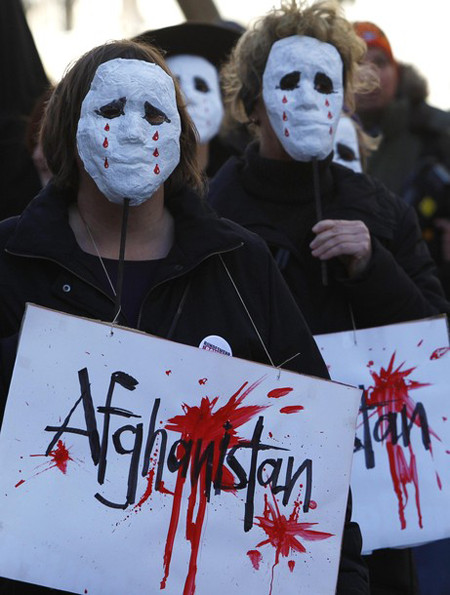New Statesman, February 14, 2011
The reality of Britain’s War in Afghanistan
With the war in Afghanistan entering its tenth year, a report by War on Want exposes the truth behind the conflict
By Yasmin Khan
As the US-led occupation of Afghanistan enters its tenth year, casualties have risen among Afghan civilians and NATO forces alike, making the last 12 months the bloodiest of the conflict to date. US and British forces are engaged in a dirty war in Afghanistan, using aerial bombing, drone attacks, torture prisons and corporate mercenaries against the Afghan people, all of which are fuelling further insecurity and fostering human rights abuse.

Protestors hold placards that read Afghanistan during a demonstration while the 47th Conference on Security Policy takes place in Munich February 5, 2011. (Photo: Reuters)
Afghanistan has become one of the most militarised countries on earth, with the security sector far and away the largest single element of national expenditure. Recent years have seen UK suppliers export arms worth £32.5 million to Afghanistan. Alongside the US and British military in Afghanistan is a 'shadow army' of private military and security companies (PMSCs) Between 2007 and 2009, the UK government spent £62.8 million on these private military and security companies in Afghanistan.
Afghanistan has borne the brunt of decades of foreign intervention and conflict, and as a result is one of the poorest countries in the world. Life expectancy is 44.6 years, one of the lowest in the world. Yet development policy is being used to pursue military goals and to privatise the country's economy, while multinational companies profit at the expense of one of the least developed countries. Of the $38.6 billion given in US aid to Afghanistan between 2002 and 2009, 56 per cent was spent on 'security', primarily building up the army and police.
The future of Afghanistan is being determined by the self-interest of the USA, UK and other occupying powers. In July 2009 the then Defence Secretary Bob Ainsworth stated: "The entire region in which Afghanistan sits is of vital strategic importance to the United Kingdom. British interests in the region are closely aligned with those of the USA The USA considers Afghanistan of critical geopolitical importance for its long term interests in Central and South Asia, as well as for the country's significance as a neighbour of Iran. In addition to its other strategic interests, the USA has long promoted a natural gas pipeline through Afghanistan. in December 2010. US Assistant Secretary of State, Richard Boucher, confirmed in 2007 that "one of our goals is to stabilise Afghanistan... so that energy can flow to the south".
As it becomes increasingly clear that the US and UK military presence is a central part of the problem in Afghanistan, not the solution we need a new debate on the occupation of Afghanistan. Over 70 per cent of British people favour a withdrawal of British troops either soon or immediately. Yet all three major UK political parties are committed to continuing the military offensive and keeping British forces in Afghanistan until 2015 and maintaining a strategic presence for an undetermined time thereafter. It is time for the immediate withdrawal of British troops from Afghanistan, and a negotiated settlement which guarantees self-determination, security and human rights for the Afghan people. We owe it to the Afghan people to stand up for their rights and to end the occupation of their country, so that the process of reconstruction can at last begin.
Yasmin Khan is Senior Campaigns Officer for War on Want.
Characters Count: 3964
